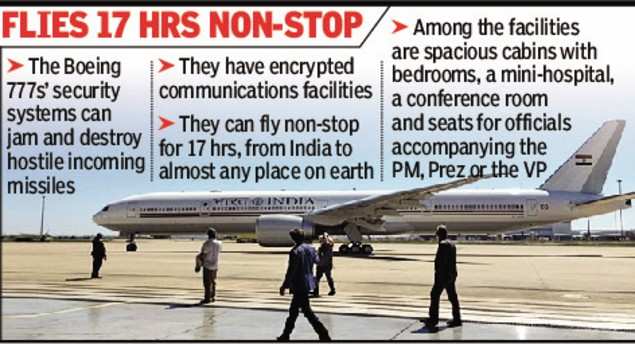
Boeing is likely to receive another custom-made B777 aircraft for VVIP travel at a later date.
Here are some key points about the aircraft:
* The two Boeing 777 aircraft were part of Air indiacommercial fleet for a few months after being delivered in January 2018. Later, they were shipped back to Boeing to be adapted for VVIP travel.
* The aircraft were ordered by Air India in 2005 as part of fifteen B777-300 Extended Range (ER) aircraft.
* Equipped with state-of-the-art missile defense systems called Large Aircraft Countermeasures (LAIRCM) and Self Protection Suites (SPS), the aircraft will be operated by Indian Air Force (IAF) pilots.
* Advanced security systems will allow them to block and defeat hostile incoming missiles. The planes are also encrypted with communication facilities.

* Unlike jumbos that need a stopover, these planes can fly 17 hours nonstop from India to almost anywhere on Earth.
* Facilities include spacious cabins with dormitories, a mini hospital, a conference room, and seating for the officials accompanying the president, vice president and prime minister.
* Both aircraft will be owned by the government: The aircraft used so far for VVIP travel belonged to AI, which is also owned by the government.
* The new B777s will replace Air India’s B747 aircraft that were used to fly dignitaries for the past 25 years and were piloted by Air India pilots.
* Air India Engineering will manage the maintenance work for the two aircraft. Two hangars will be built on the technical side of Palam for them.
* The total cost of the aircraft, including modifications, was set at Rs 4,469.50 crore, money that came from the National Small Savings Fund, according to the 2018-19 budget. However, a PTI report citing officials said the new cost came to Rs 8,400 crore.
* Air India B777 flew into the country directly from Boeing Defense’s base in Texas and will likely operate its first VVIP flight next month.
* The aircraft was supposed to be delivered by Boeing to Air India in July, but delivery was delayed twice: once in July for weeks due to the Covid-19 pandemic and then again in August for technical reasons.
(With contributions from the agency)
.